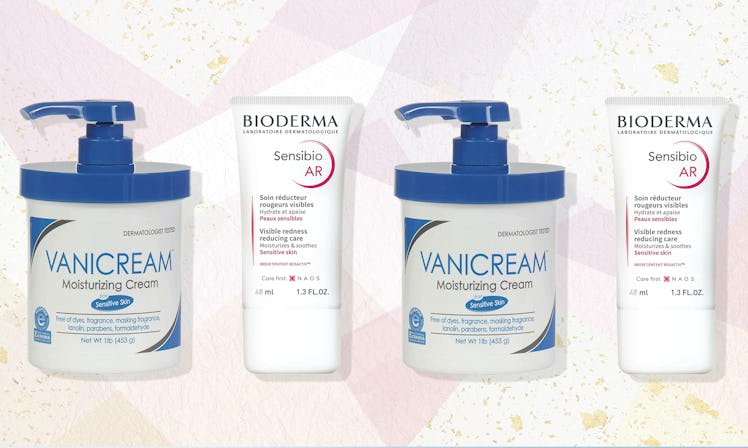
A Dermatologist Reveals The Best Ways To Treat Rosacea Without A Prescription
Treating rosacea on your own can be tricky, confusing, and often, downright frustrating — but armed with the right knowledge (and the right products), it is possible. To learn more about the best over-the-counter rosacea treatments, Bustle spoke with board-certified cosmetic dermatologist Dr. Shereene Idriss, who advises using gentle, fragrance-free products and avoiding potentially irritating ingredients such as witch hazel and certain essential oils, like peppermint and eucalyptus. (The American Academy of Dermatology says that menthol, camphor, and sodium lauryl sulfate are common triggers, as well.) "Less is more," explains Dr. Idriss, because, "The more ingredients and products that rosacea patients apply to their skin, the higher the likelihood that an ingredient or product may aggravate the condition and cause a flareup.”
Dr. Idriss adds that gentle cleansing is extremely important, while moisturizing is “key for preventing the burning, stinging, itching and irritation often associated with the condition.” Finally, daily sunscreen use is essential, because sun exposure can aggravate rosacea symptoms further. And for any new product you're introducing, be sure to do a patch test on your inner arm before using it on your face.
When possible, people with rosacea should also avoid certain lifestyle and environmental triggers that can aggravate the condition and provoke flareups, such as sun exposure, emotional stress, hot or cold weather, wind, alcohol, spicy foods, heavy exercise, hot baths, and heated beverages, says Dr. Idriss. Finally, though over-the-counter products can help calm skin and reduce the severity of flareups, Dr. Idriss suggests speaking with a dermatologist to discuss your concerns and review prescription treatment options.
With that in mind, scroll on to shop the best rosacea treatments that don't require a prescription.
We only recommend products we love and that we think you will, too. We may receive a portion of sales from products purchased from this article, which was written by our Commerce team.
01Best Cleanser For Rosacea
It's hard to find a more mild face wash than Vanicream's Gentle Facial Cleanser, which is recommended by scores of dermatologists and even boasts the seal of approval from the National Eczema Association. Basic in the best way, it's free of just about any ingredient that could potentially be irritating to people with sensitive skin or rosacea: oil, soap, sulfates, preservatives, fragrance, essential oils, parabens, and even gluten. Despite it's sulfate-free formula, it still produces a nice lather, so your skin will be left feeling nice and clean (but not dry and tight). Not surprisingly, it's extremely popular with Amazon reviewers, too, who have awarded it over 4,000 five-star ratings thus far.
02Best Moisturizer For Rosacea
Bioderma Sensibio AR Cream is a fragrance-free, hypoallergenic moisturizer full of skin-calming ingredients like allantoin and laminaria (seaweed), which is known for its ability to soothe inflamed skin. It helps improve your skin's barrier function and make irritated skin feel more comfortable, but perhaps best of all for people with rosacea, it works to neutralize redness in both the immediate and over time. Apply this every morning to stay flush-free all day long.
03Best Night Cream For Rosacea
Another great, but slightly richer moisturizer for people with rosacea, Eucerin's Redness Relief Night Creme helps calm red, irritated skin with licochalcone (extract of licorice root), a natural anti-inflammatory ingredient. Apply immediately after cleansing for an effective overnight treatment to soothe and rehydrate dry, sensitive skin.
04Best Serum For Rosacea
In a randomized controlled trial, La Roche-Posay's Rosaliac AR Intense Visible Redness Reducing Serum has been shown to be effective at helping subjects manage their rosacea, thanks to three key ingredients in the formula: Ambophenol, Neurosensine, and the brand's soothing thermal spring water. The refreshing, fragrance-free serum, which helps reduce and prevent redness, has a lightweight texture and is housed in airtight packaging to keep out contaminants. With consistent use, expect both immediate and long-term results.
05Best Sunscreen For Rosacea
Not only is it important to use sunscreen to reduce your risk of skin cancer, but also, sun exposure is one of the biggest rosacea triggers out there. So be sure to apply a gentle sunscreen, like the fan-favorite EltaMD UV Clear Broad-Spectrum SPF 46, every morning. Designed for people prone to acne, rosacea, and hyperpigmentation, it contains soothing ingredients like niacinamide and hyaluronic acid (as well as 9% zinc oxide for sun protection), while it doesn't contain any oil, parabens, or fragrance. It offers some protection against free radical damage, too, thanks to the antioxidants in the formula.
06Best Body Lotion For Rosacea
Most people only see evidence of rosacea on their face, but if you have rosacea on other parts of your body, such as your neck, chest, or back, pick up Vanicream Moisturizing Cream, a popular choice among dermatologists who appreciate its ultra gentle formula and the long-lasting moisture it provides. It's free of just about all the potential irritants out there — fragrance, dyes, parabens, even lanolin and gluten — it comes in a massive, 1-pound tub, and it can be used on your face, hands, feet, and body, as often as you want.
07You Might Also Like:
Though this isn't actually a treatment, if you want to immediately and effectively reduce the appearance of redness, choosing a makeup product with a green tint can be helpful (that's because green is opposite to red on the color wheel, so they help cancel each other out). This Touch In Sol primer, which is rich in tons of good-for-skin ingredients like centella asiatica, pumpkin oil, jojoba oil, and hyaluronic acid, can be worn on its own or underneath foundation to help neutralize redness and create a smooth, soft base. Note that you only need a small amount (about a drop or two) to conceal redness, so try not to overdo it the first time.
Expert:
Dr. Shereene Idriss, a board-certified cosmetic dermatologist based in New York.